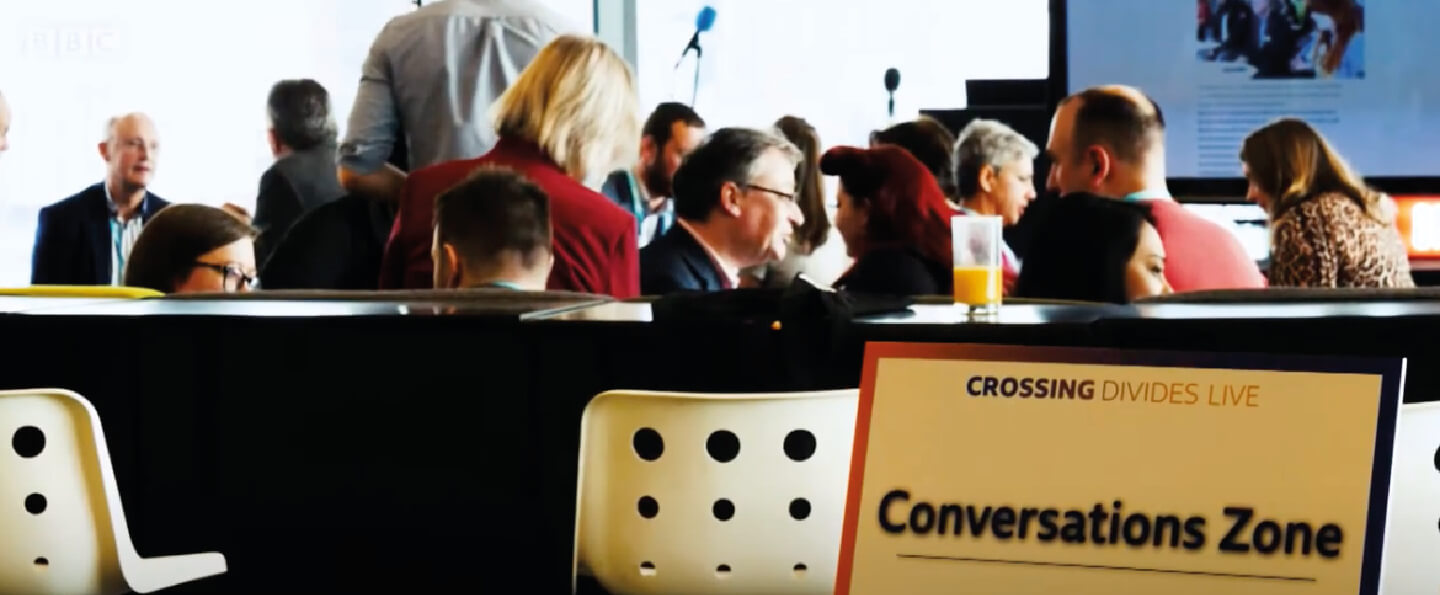How To Produce a Season of Constructive Coverage
“Crossing Divides draws on the BBC’s public purpose to contribute to social cohesion and our solutions-focused journalism initiative to explore themes of collaboration and relationships across divides”
Emily Kasriel, Season Editor, BBC
March 2019- March 2020 BBC News rolled out a year-long season of coverage called Crossing Divides, examining stories that bring people together in a fragmented world and encouraging encounters between people from different perspectives. The season was part of an ongoing drive to grow solutions-focused journalism within the BBC.
How They Did It
The BBC developed an ambitious project with Crossing Divides. The aim was to spend a year exploring the power and possibilities of encountering people with conflicting opinions, across divisions of race, class, faith, politics and generation. The journalists involved hoped to tackle one of the biggest challenges of our age – polarisation and fragmentation of society. The project supported the BBC’s public service mandate “contributing to social cohesion”. Journalists rolled it out across the BBC’s wide range of platforms developing programs and news stories for TV, news, radio and online.
Crossing Divides was driven by the Season’s Editor Emily Kasriel and is just one of the projects she has embarked on with a solutions focus. Emily sees her role as “kick-starting a culture change inside the organisation,” a change to a journalism culture which would value solutions-focused stories alongside news reports investigating the problems in our world. As well as reporting problems, her approach encourages journalists to explore solutions – looking at limitations, discovering whether a solution can scale, and always asking challenging questions.
The Crossing Divides Live Festival brought 200 people together to listen to others with widely differing beliefs and views.
A successful pilot
The Crossing Divides season was developed after the success of a week-long News pilot in April 2018. During the experimental week news stories ranged from from why a Yorkshire Dales farmer is working with asylum seekers to how a Kenyan prison is using mindfulness to create a different relationship between prisoners and prison officers.
Emily felt that the pilot gave a boost to editorial teams when approaching solutions focused journalism, she explained that “A season like this makes people feel confident that news can include stories of how people are solving problems, and of how divides are being crossed.”
Crossing Divides stories have attracted over 40 million page views and the video stories have had over 40 million views on social media.
Crossing Divides stories have attracted over 40 million page views and the video stories have had over 40 million views on social media.
A pan BBC effort
With Crossing Divides, the BBC stepped up its solutions approach for a year-long project using the extensive range of the BBC TV, news, radio and online and enabling a multifaceted approach which could cater for diverse audiences. Emily describe it as a “Pan BBC multiplatform season”.
The project was aimed to inspire both a local and an international conversation. National and international conflicts and solutions were addressed via programs such as a series on the national television station BBC Two called Pilgrimage, following eight personalities with wildly different beliefs and faiths as they travelled together on a demanding pilgrimage to see if they could understand each other better. Local concerns were also prioritized. The BBC worked with all 39 BBC local radio stations across England. Their local engagement producers identified three of the most pressing divides in their local communities, and then recorded ground-breaking conversations between participants on either side of the divide. The local radio stations used these 100 plus encounters to kickstart a week of conversation on air. Different issues concerned each community and the varying perspectives were then discussed through phone ins and live debates.
Solutions Focus at the BBC
As well as targeted seasons of solutions focused programming Emily carries out workshops with BBC staff where participants broaden their understanding of what news is to also include a focus on solutions. The core idea is that BBC News can paint a fuller and more complete picture by reporting beyond the problem and thereby deliver a more accurate story of the world.
Solutions-focused journalism is particularly important for the BBC as it is what their young audiences are asking for. According to BBC research carried out at the start of their solutions journalism efforts in 2016, 51% of 16-18 year olds and 47% of 19-24 year olds in the UK “agree or strongly agree” that they want news to also provide solutions. The figures were even higher in the developing world: 75% of Indians, 78% of Nigerians and 82% of Kenyans of all ages want their news to provide solutions and not just problems. The initiative recognized the appetite within young audiences to feel empowered in their media consumption and offers a new approach to reporting solutions.
Connecting people face to face
As well as special reports and a broad range of programming the season sparked a host of innovative events. The aim was to connect audiences across their social, ethnic, political, religious, geographical or generational divides.
BBC Radio 5 Live, one of the broadcaster’s channels with a national reach, partnered with Crossing Divides for the Crossing Divides Live Festival. Emily trained over 200 members of the public in Deep Listening with a practical exercise where participants were matched with a stranger who harboured opposing views about contentious issues ranging from Brexit to immigration to class. They welcomed people from diverse communities – those who had experienced homelessness to Manchester University students, young people originally from Nigeria to recent immigrants from Syria, white working-class community leaders to Quaker environmentalists.
The News Channel followed the action and BBC 5Live updated a live page throughout the day. Programmes from the 5Live Breakfast show to the World Service’s Outside Source explained the Deep Listening technique and shared participants’ stories. The News Channel followed the action and BBC 5Live updated a live page throughout the day.

At the event, they matched every participant with someone who thinks differently.
After the festival, feedback evaluated by academics evidenced that 87% of participants felt that they knew how to deeply listen to people with different opinions to their own, 73% were more confident to talk to people they disagreed with and 76% could feel more empathy towards them.
After the festival 87% of participants felt that they knew how to deeply listen to people with different opinions to their own, 73% were more confident to talk to people they disagreed with and 76% could feel more empathy towards them.
One of the challenges of the season was to find ways to help connect individuals and communities who share common spaces but rarely interact. In response the Crossing Divide’s team partnered with public transport companies across the UK for a Crossing Divides on the Move day last summer, encouraging passengers to have conversations with strangers. It was a day of special experiments across the UK’s train and bus networks designed to spark discussion between passengers, with 8 major UK transport companies taking part.
Key Takeaways
1. Multiplatform. A constructive “season” allows collaboration across media platform and programs and different approaches to connect audiences.
2. Young audiences. Young audiences are requesting constructive stories particularly those from developing world regions.
3. Innovative events. Events offer opportunities to connect audiences offline and can bridge divides through “deep listening.”

